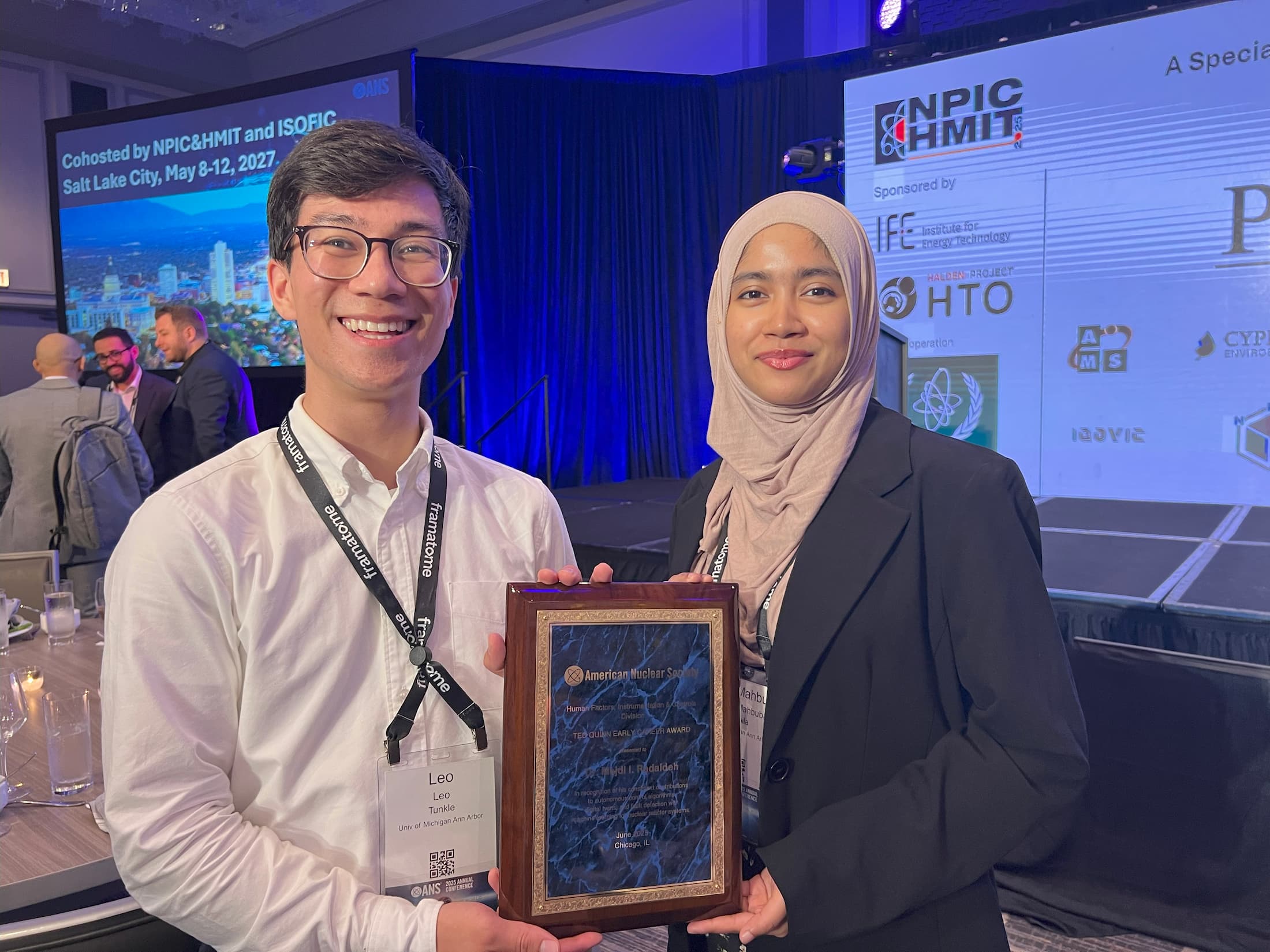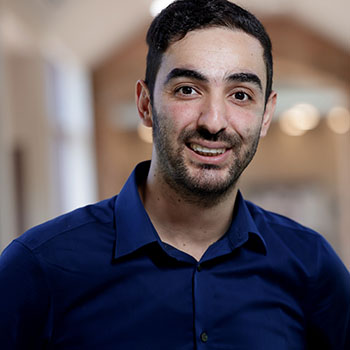
Majdi Radaideh receives ANS Ted Quinn Early Career Award
The award honors outstanding contributions in instrumentation, control, and human-machine interfaces for nuclear systems.

The award honors outstanding contributions in instrumentation, control, and human-machine interfaces for nuclear systems.

Majdi Radaideh, assistant professor in the Department of Nuclear Engineering and Radiological Sciences (NERS) at the University of Michigan, has been selected as the 2025 recipient of the American Nuclear Society’s (ANS) Ted Quinn Early Career Award. The honor recognizes exceptional early-career contributions to the advancement of nuclear instrumentation, control, and human-machine interface technologies. Radaideh was selected for “his consistent contributions to autonomous control algorithms, digital twins, and fault detection with machine learning for nuclear reactor systems.”
The award was presented at the ANS Nuclear Plant Instrumentation and Controls—Human Machine Interface Technology (NPIC-HMIT) Topical Meeting earlier this month in Chicago, Illinois. Leo Tunkle and Umme Nabila (pictured above), two graduate students in Radaideh’s group, accepted the award on his behalf.
NERS Department Chair Todd Allen, praised his “outstanding research, instruction, and mentorship,” as well as his rapid rise as a leader in autonomous control systems, digital twins, and machine learning applications for nuclear reactors.
Since joining NERS in January 2023, Radaideh has made an impact across all facets of academia—research, teaching, and service. Within his first two years, he secured $3.3 million in funding as principal investigator, part of a total $7.4 million in collaborative awards, supporting a growing research group of 22 members. His lab includes two postdoctoral fellows, nine PhD students, five Master’s students, and six undergraduate researchers.
His work is already influencing the next generation of nuclear systems. Radaideh’s research integrates machine learning into fault detection, reactor diagnostics, and control strategies for both traditional and advanced reactor concepts. His collaborators include the U.S. Department of Energy, Nuclear Regulatory Commission, Holtec International, Idaho National Laboratory, and the Michigan Institute for Data Science, among others. He also receives support from philanthropic organizations like the Eric & Wendy Schmidt Foundation.
With more than 50 peer-reviewed journal publications, a book chapter, and nearly 1,150 citations to date, Radaideh has achieved an h-index of 22—an impressive metric for a junior faculty member. His papers span journals such as Expert Systems with Applications, Nuclear Engineering and Design, International Journal of Prognostics and Health Management, Digital Signal Processing, and Reliability Engineering & System Safety, reflecting the broad applicability and high quality of his research.
“I am grateful to the NERS department and Prof. Todd Allen for their outstanding mentorship and continued support,” said Radaideh. “I also want to recognize my incredible students who are pushing the boundaries of research in this field. A heartfelt thank you to my past mentors and colleagues whose guidance has shaped my journey—Prof. Tomasz Kozlowski (UIUC), Prof. Koroush Shirvan (MIT), Dr. Pradeep Ramuhalli (ORNL), Dr. Vivek Agarwal (INL), and Prof. Brendan Kochunas (NERS)—for their support of this nomination.”
Radaideh is helping redefine how nuclear engineering is taught in the era of AI and advanced computing. At the undergraduate level, he redesigned and modernized NERS 442: Nuclear Power Reactors, introducing students to neural networks and reactor control using AI. At the graduate level, he created a new course—NERS 590: Applied Machine Learning for Nuclear Engineers—which blends theoretical instruction with hands-on programming labs. The course quickly became one of the department’s most popular electives, praised for its relevance and rigor.
Beyond the classroom, Radaideh is a dedicated mentor. His students have received prestigious awards, including two NSF Graduate Research Fellowships, three ANS Graduate Scholarships, and a DOE Nuclear Energy University Program (NEUP) Fellowship. One of his senior design teams earned the Best Presentation Award at the ANS Student Conference.
The Ted Quinn Early Career Award adds to a growing list of accolades for Radaideh, including the 2025 Young Member’s Research Achievement Award from the Mathematics and Computation Division of ANS, the 2019 ANS Mark Mills Award for his doctoral research, and the 2023 DOE Distinguished Early Career Award.
“Radaideh is an outstanding young researcher, teacher, and mentor,” Allen concluded. “He is helping define what the future of nuclear engineering looks like—and it’s a future powered by intelligent systems, collaborative leadership, and inspired students.”